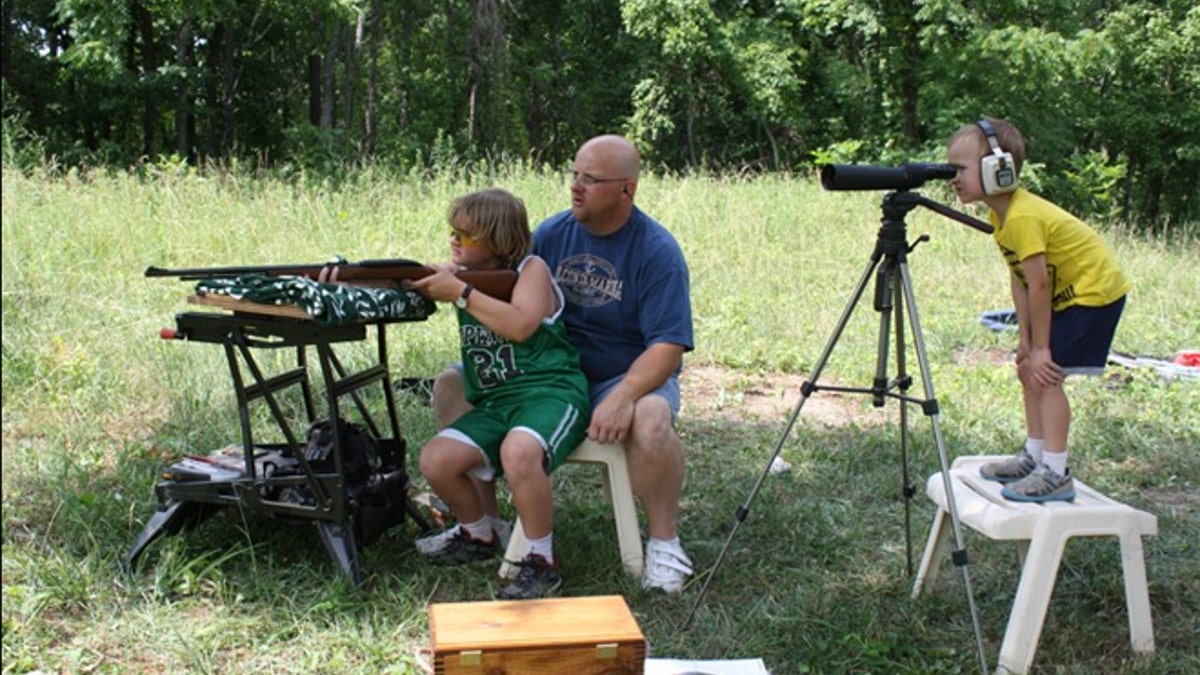
Kenneth and Colleen Shults with their children, including the foster daughter they hope to adopt, whose identity was intentionally obscured pending the case. (Courtesy: Shults family)
Kenneth and Colleen Shults want to permanently welcome a foster child into their Fairmount, Ill., family, but claim in a federal suit filed this week they are being forced to surrender their Second Amendment rights to do it.
Already parents of three, the couple is in the process of formally adopting a daughter through the state foster care system and is fighting Department of Children and Family Services rules they say severely restrict their gun rights. The couple charges that the firearm restrictions aimed at safeguarding foster children violate their constitutional rights and threaten their ability to keep their family safe.
“Our family has always owned and used firearms,” said Kenneth Shults, 37, who is a firearms safety instructor and a machine shop manager. “No foster parent should have to forfeit their constitutional rights in order to be a foster parent.”

Kenneth Shults teaches youth gun safety instruction and considers himself a responsible gun owner. (Courtesy: Shults family)
Prospective Illinois foster parents must either certify that there are no firearms in their home or complete a form called the Foster Family Firearms Arrangement. That document requires a list of all guns and ammunition in the home and locations where they are stored. Would-be foster parents also must certify the guns have trigger locks and are stored unloaded, separate from ammunition and in locked containers accessible only with a key kept off the premises or on the owner’s person.
The rules can be enforced by involuntary home inspections, according to the lawsuit.

Kenneth Shults claims the special restrictions on foster parents violate their Constitutional rights. (Courtesy: Shults family)
The state’s rules defeat the purpose of keeping a firearm for protection, said Alan Gottlieb, founder of the Washington-based Second Amendment Foundation, which has joined the suit as a plaintiff along with the Illinois State Rifle Association.
"When seconds count, having your gun unloaded, locked up and ammunition stored somewhere else makes you a likely victim of a violent crime," Gottlieb said.
The Shultses claim to have a legitimate need for the protection afforded by an accessible, loaded gun. Colleen, a nurse at the Illinois Department of Corrections’ Danville Correctional Center, was warned in March by her employer that prisoners were seeking home addresses of prison staff, including correctional officers and nurses. The letter warned that she and other prison employees should take unspecified precautions.
The Shultses have complied with the state policy so far, but now believe they need guns at the ready “for self-defense and defense of family.”
“This lawsuit is important not just for foster families in Illinois, but all across the nation,” said Gottlieb. “What we are challenging is the denial of the fundamental right to defend yourself and your family.”
The suit, filed Tuesday in U.S. District Court for the Central District of Illinois, accuses the director of the Illinois Department of Children and Family Services of deprivation of civil rights under color of law. The complaint maintains the constitutional Second Amendment rights of foster parents were violated because Illinois Department of Children and Family Services policy effectively prohibits current and prospective foster parents from possessing firearms for the purpose of self-defense.
The Illinois Department of Children and Family Services told FoxNews.com that the agency had no comment because it had not yet received and reviewed the lawsuit.
The suit is one of a series filed by the Second Amendment Foundation challenging gun laws in the state of Illinois over the last several years. One of the most publicized was McDonald v. City of Chicago, in which Otis McDonald, a maintenance worker and grandfather living in Chicago, claimed he was unable to protect himself and his family in a dangerous neighborhood because of an ordinance banning the possession of handguns.
The landmark case went to the U.S. Supreme Court in 2010, when, in a 5-4 decision, the justices held that the right of an individual to "keep and bear arms" in every state is protected by the Second Amendment.
In another Illinois lawsuit, the foundation forced the State Legislature to adopt a conceal-carry statute.
“One would think the state would have wised up by now,” Gottlieb said. “But here we are again, to make sure that the state cannot discriminate against foster parents who merely wish to exercise the rights we’ve restored in Illinois.”

